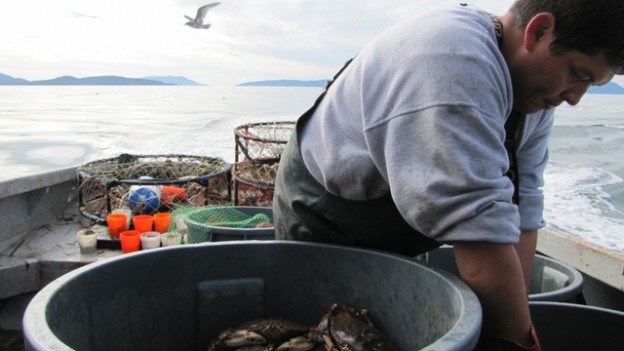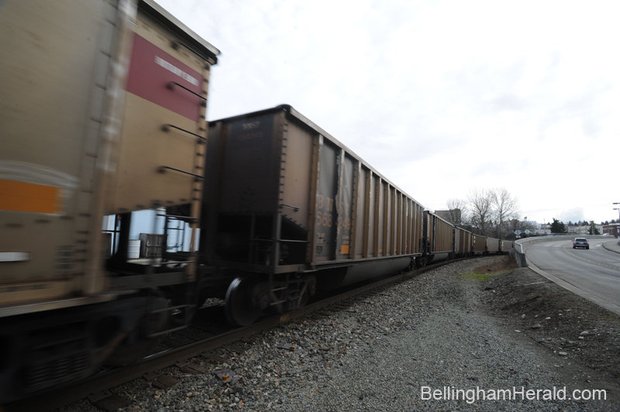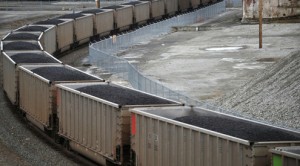
December 11, 2013 Here&Now
About a quarter of all the coal the U.S. exports goes to Asian markets. To meet the demand, there are plans to build what would be the largest coal terminal in North America at a place called Cherry Point in the far northwestern corner of Washington state.
But there’s a hitch. The waters surrounding Cherry Point support a fishing industry worth millions of dollars. It’s also a sacred place for the Lummi tribe, whose reservation is nearby. And thanks to a landmark legal decision in the 1970s, tribes have the right to weigh in on — and even stop — projects that could affect their fishing grounds.
From the Here & Now Contributors Network, Ashley Ahearn of KUOW reports.
Reporter
Ashley Ahearn, environment reporter for KUOW and part of the regional multimedia collaborative project EarthFix.
Follow link to listen to Transcript
JEREMY HOBSON, HOST:
It’s HERE AND NOW.
Coal prices are at the highest levels in months thanks to strong demand from Asian markets like China. And to help meet that demand, there are plans to build a huge new coal terminal in Washington State, at a place called Cherry Point. But the waters surrounding Cherry Point support a fishing industry that’s worth millions of dollars, and it’s a sacred place for the Lummi tribe, which has the right to weigh in on or put a stop to projects that could affect their fishing grounds.
From the HERE AND NOW Contributors Network, KUOW’s Ashley Ahearn reports.
ASHLEY AHEARN, BYLINE: Jay Julius and his crew pull crab pots up out of the deep blue waters near Cherry Point. From massive buckets on deck comes the clack and rustle of delicious Dungeness crabs in futile attempts at escape. We’re about 15 miles south of the Canadian border.
JAY JULIUS COUNCILMEMBER, LUMMI TRIBAL COUNCIL: That’s not bad.
AHEARN: Jay Julius is a member of the Lummi tribal council. His ancestors have fished these waters, just like he does now, for thousands of years. One out of every 10 Lummi tribal members has a fishing license, and the Lummi tribal fishery is worth $15 million annually.
COUNCIL: So now we’re entering the proposed area for the coal port. As you can see, the buoys start.
AHEARN: Dozens upon dozens of crab pots buoys dot the waters around us, like a brightly colored obstacle course as we approach Cherry Point.
COUNCIL: We see buoys up there.
AHEARN: If the Gateway Pacific Terminal is built, it could draw more than 450 ships per year to take the coal to Asia. Those ships would travel through this area of Cherry Point. The tribe is worried that its shellfish, salmon and halibut fishery will suffer.
COUNCIL: What does that mean to our treaty right to fish? This will be no more.
AHEARN: That treaty right to fish could play a major role in the review process for the Gateway Pacific Terminal and the two other coal terminals under consideration in the Northwest. In the mid-1800s, tribes in this region signed treaties with the federal government, seeding millions of acres of their land. But the tribal leaders of the time did a very smart thing, says Tim Brewer. He’s a lawyer with the Tulalip tribe.
TIM BREWER: What they insisted on was reserving the right to continue to fish in their usual and accustomed fishing areas. Extremely important part of the treaty.
AHEARN: Those treaty rights weren’t enforced in Washington until a momentous court decision in 1970s known as the Boldt Decision. It forced the state to follow up on the treaty promise of fishing rights that were made to the tribes more than a century before. Brewer says the phrase, usual and accustomed fishing areas, has implications for development projects, like coal terminals.
BREWER: If a project is going to impair access to a fishing ground and that impairment is significant, that project cannot move forward without violating the treaty right.
AHEARN: And in recent decades, tribes have flexed to those treaty muscles. The Lummi stopped a fish farm that was planned for the water’s off of Lummi island in the mid-’90s. The tribe argued that constructing the floating net pens would block tribal access to their usual and accustomed fishing grounds.
BREWER: And in that case, the Corps of Engineers denied that permit on that basis. There was no agreement that was bled to be worked out there.
AHEARN: But in other situations, agreements had been made.
DWIGHT JONES: My name is Dwight Jones. We’re at L.A. Bay Marina.
AHEARN: Jones is the general manager of the marina. Behind where he’s standing, Seattle’s Space Needle pierces the downtown skyline in the distance.
JONES: L.A. Bay Marina is the largest privately owned and operated marina on the West Coast. We have about 1,250 slips.
AHEARN: The marina was built in 1991 after a decade of environmental review and haggling with the Muckleshoot tribe. The marina is within the tribe’s treaty fishing area.
JONES: It was contentious, I guess, would be the right word.
AHEARN: Could they have stopped this project from being built?
JONES: Oh, absolutely. Absolutely they could’ve stopped it.
AHEARN: But they didn’t. Instead, the tribe negotiated a settlement. The owners of L.A. Bay Marina paid the Muckleshoot more than a million dollars upfront. And for the next hundred years, they will give the tribe eight percent of their gross annual revenue.
JONES: Anybody in business can tell you that eight percent of your gross revenue is a huge number. It really affects your viability as a business, so…
AHEARN: What would you say to companies that are trying to build a coal terminal?
(LAUGHTER)
JONES: I’d say good luck. It’s a long road, and there will be a lot of cost and the chances are, the tribes will make it – will probably negotiate a settlement that works well for them and will be – not be cheap.
AHEARN: SSA Marine and Pacific International Terminals, the companies that want to build the terminal at Cherry Point, have lawyers and staff members trying to negotiate a deal with the Lummi. But Jay Julias, a Lummi councilmember, laughs when I asked him how he feels about the company’s efforts to make inroads with the tribe.
COUNCIL: I say they’re funny, but I think they’re quite disgusting. The way they’re trying to infiltrate our nation, contaminate it, use people – it’s nothing new.
AHEARN: SSA Marine declined repeated requests to be interviewed for this story. But they emailed a statement. It says: We sincerely respect the Lummi way of life and the importance of fishing to the tribe. We continue to believe we can come to an understanding with the Lummi nation regarding the Gateway Pacific Terminal project. For HERE AND NOW, I’m Ashley Ahearn in Seattle. Transcript provided by NPR, Copyright NPR.













